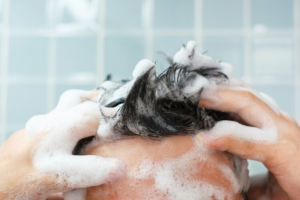Is Caffeine the Next Hair Loss Solution?

If you’re losing your hair, you may be rethinking your diet. After all, diet does affect the quality of your hair. We know that processed foods and too much alcohol aren’t recommended if you are experiencing hair loss. If you’re one of those people who can’t get your day started without a steaming hot cup of coffee, though, you may be excited to learn what you thought was a vice may actually help you. Yes, it’s true. Researchers have been studying the effects of caffeine on male and female pattern hair loss. So, here’s the million-dollar question. Is caffeine the secret weapon to fighting genetic hair loss? Grab a cup, find a comfortable chair, and keep reading.
Caffeine: Drink or Drug?
You’re probably very familiar with caffeine found in coffee, tea, chocolate, some sodas, pain relievers, and other over-the-counter medications. But, this may come as a surprise to you. Caffeine is categorized as a drug by the FDA. The reason why is that caffeine stimulates the nervous system. That causes you to be more awake after downing a cup of coffee, tea, or energy drink such as Red Bull that contains caffeine. Caffeine is also found in many pain relievers, over-the-counter medications, and supplements. Research shows that when caffeine is added to ibuprofen and other common analgesics, patients experience a higher level of pain relief. (01) Caffeine increases the absorption and strength of the medication. Patients with migraines are often told that caffeine can help relieve their symptoms.
What’s the Connection Between Caffeine and Your Hair?
If you are experiencing androgenetic alopecia, you may be wondering whether caffeine can contribute to your hair loss. The good news is that you don’t have to go into panic mode. Caffeine won’t make you lose more hair. Dr. Ben Behnam, board-certified dermatologist, hair specialist, and founder of Happy Hair hair loss solutions, doesn’t mind when his hair loss patients indulge in coffee or tea. Although he recommends avoiding energy drinks and processed foods, he gives thumbs up to caffeine.
Does Caffeine Stimulate Hair Growth?
Not only is caffeine not harmful, research indicates that caffeine can help patients who are experiencing male or female pattern hair loss. In one study,, concentrations of .001 percent and .005 percent caffeine led to growth of hair follicles preserved in test tubes. (02) Another study on the effects of caffeine contained in cosmetics discovered that caffeine acts as a DHT blocker. (03) As a stimulant, caffeine can also increase circulation to your hair follicles, allowing it to work similarly to Minoxidil. (04)
Can You Substitute Caffeine for Hair Loss Treatments if You Have Male or Female Pattern Hair Loss?
Don’t abandon your Minoxidil, Finasteride, or other prescription hair loss treatments just yet. More research needs to be conducted on the most effective amount of caffeine and the best delivery method. Low to moderate amounts of caffeine are safe; however, you would need to ingest a large amount of caffeine to prevent genetic hair loss. Yes, you can buy caffeine pills, but they come with many potential side effects, including high blood pressure, increased urination, and heartburn.
What About Using Caffeine Topically to Treat Hair Loss?
Another option to try caffeine to treat male or female pattern hair loss is applying it topically. One research study indicated that a .2 percent topical caffeine solution worked almost as effectively as Minoxidil. (05) Caffeinated shampoos are an option. When selecting a shampoo, however, keep in mind that the concentration of caffeine will most likely not be as high as the formula used in the study. Many shampoos do not include the concentration of caffeine on their ingredients list. Another option is a coffee rinse. Again, there isn’t a guarantee that a coffee rinse will work, but if you try it, make sure that the coffee you use is completely cool before you pour it into a spray bottle and spray it on.
Other Hair Loss Treatments
If experimenting with caffeine isn’t for you, other hair loss treatments are worth using. Prescription medications have been proven to be the most effective for treating male and female pattern hair loss and other forms of alopecia. FDA-approved Minoxidil and Finasteride are first-line treatments for male and female pattern hair loss and produce measurable results in many people. Minoxidil enlarges the hair follicles so hair can grow healthy and strong. Finasteride is a hormone blocker that prevents testosterone from converting to dihydrotestosterone (DHT). Minoxidil and Finasteride are often used at the same time. Although Finasteride works for most, some people need to step-up to Dutasteride, a more potent DHT blocker. Women who need a stronger prescription may try Spironolactone, another pill with a different formulation that is also stronger than Finasteride. Combination topical prescription medications are also available and more convenient than using multiple medications.
To sum up, research indicated that caffeine may be a viable hair loss solution. However, if you’re thinking about using caffeine to prevent hair loss and to grow new hair, look carefully at the percentages of caffeine in the product you plan to use. Odds are that the concentration won’t be high enough to prevent further hair loss and stimulate regrowth. Additional research and product development still needs to occur.
In the meanwhile, if your hair is thinning or balding and you would like to start treatment, customizable Happy Head hair loss solution may be just what the doctor ordered. Contact us so that one of our board-certified dermatologists can review your case and determine whether you would be a good candidate for our topical prescription hair loss medication.
Resources:
(01) https://www.ncbi.nlm.nih.gov/pmc/articles/PMC6485702/
(02) https://onlinelibrary.wiley.com/doi/abs/10.1111/j.1365-4632.2007.03119.x
(03) https://pubmed.ncbi.nlm.nih.gov/23075568/
(04) https://www.ncbi.nlm.nih.gov/pmc/articles/PMC5804833/
(05) https://www.ncbi.nlm.nih.gov/pmc/articles/PMC5804833/




